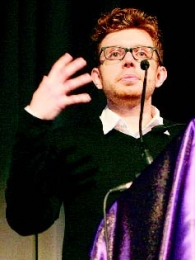The only programme on mainstream Irish radio dealing specifically with immigrant issues will not be coming back to the airwaves.
The MAMA Award-winning Spectrum on RTÉ Radio One was last broadcast in December and has since been cancelled, the national broadcaster has confirmed.
RTÉ maintained to Metro Éireann that it was determined that the voices of Ireland’s new communities be heard on the national airwaves. Despite this, the broadcaster has been criticised for its under-representation of immigrants, which now make up 10 per cent of Ireland’s population.
Yemi Adenuga, who had a brief stint presenting Spectrum and was involved in other projects with RTÉ, said: “I don’t think [new communities] are represented, not at all. How many non-Irish presenters do you see or hear on RTÉ? How many reporters and newsreaders?”
Spectrum ran on RTÉ Radio One for over four years, usually broadcast on Saturday evenings. It featured studio discussions, reports and interviews focusing on issues affecting immigrants. In November last year Spectrum won a Metro Éireann Media & Multicultural Award for its services to Ireland’s new communities.
In a statement to Metro Éireann, RTÉ said that Spectrum worked as a “launch pad” to introduce new ethnic communities to RTÉ Radio One and its audience.
“Now that Ireland’s new communities have become a more established part of Irish society, multicultural concerns, questions and news stories will be integrated into the mainstream daytime schedule when there is a much larger audience listening to radio than at evening on the weekend,” it said.
Spectrum was initially presented by Melanie Verwoerd, former South African ambassador and now executive director of Unicef Ireland, and subsequently by Zbyzsek Zalinski, RTÉ’s first-ever Polish-born presenter. The national broadcaster said that following the cancellation of the programme, Zalinski was appointed as a reporter with responsibility for diversity.
“[Zalinski] will be responsible for the development of a database of contacts and spokespeople representing Ireland’s various ethnic communities and ensuring that those voices are heard on daytime radio,” said the national broadcaster. “He will also be expected to monitor the level and tone of coverage of multicultural questions.”
Speaking to Metro Éireann, Zalinski said his new position would involve being both on the air as a reporter and behind the scenes as a researcher. He said his particular detail was “a very broadly defined diversity” which would include not only ethnic minorities, but also the disabled, the elderly, sexual minorities and other groups.
“I believe it’s a very positive development,” he said of the change in RTÉ’s policy. “It gives real representation to minorities, rather than assigning a single programme to them.”
viktor@metroeireann.com












